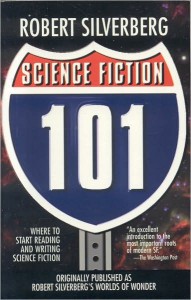 Originally published in 1987 as *Robert Silverberg’s Worlds of Wonder*, this handsome book has been rereleased under the new title of *Science Fiction 101: Where To Start*, and proves that even with a facelift, it hasn’t aged at all. It’s still as fascinating and informative as ever, and just as relevant for a new generation of science fiction readers and writers. Part essays, part memoirs, and part anthology, it manages to blend the various elements into a seamless whole.
Originally published in 1987 as *Robert Silverberg’s Worlds of Wonder*, this handsome book has been rereleased under the new title of *Science Fiction 101: Where To Start*, and proves that even with a facelift, it hasn’t aged at all. It’s still as fascinating and informative as ever, and just as relevant for a new generation of science fiction readers and writers. Part essays, part memoirs, and part anthology, it manages to blend the various elements into a seamless whole.
Essentially, what this is, is Silverberg’s commentary on what exactly makes science fiction. What invoked his sense of wonder, suspended his disbelief, and sparked his imagination. What stands out as the finest examples of the genre, with an eye towards their heuristic value. What can we take away from studying these stories, and apply to our own reading experience, or in some cases, to our own writing? He lays it out in a series of crisp, accessible essays following each of his choices. He outlines the aspects that brought him to each story, and how they define science fiction itself, aspects that include the underlying speculative concept, and the imposition of a sense of limitations within the assumption of the story. Not every story is what we’d consider a classic, but all bear the traits that made Silverberg, long considered a master of the science fiction field, choose them as examples.
For instance, C.M. Kornbluth’s “Little Black Bag” contrasts seeming utopia and dystopia, explores the wonders of technology, employs logical aspects of time travel, and the ultimate degeneration of intelligence when our own tools get too smart for us, all while playing with morality and sharp characterization. Philip K. Dick’s brilliant “Colony” demonstrates the blending of science fiction and horror with a true understanding of what makes the alien so terrifying, and ends with his traditional subtlety, leaving the exact nature of the finale to the imagination where it belongs.
Alfred Bester’s “Fondly Fahrenheit” is chilling, a psychological tale of a man, a android, and a murderer that only comes out when it gets too hot. Who’s insane, the man or his android, and what’s really going on? The rapidly shifting perspective and tense usage (sporting sentences like “He doesn’t know which of us I am these days, but they know one truth”) both jostle the reader and keep the characters of the story at uncomfortable arm’s length. Breaking grammatical rules like very few ever can, Bester’s story is an example of what a skilled writer can accomplish with the genre. However, Robert Sheckley’s “The Monsters” takes things to an even more alien perspective, where humans are the true indecipherable, unfathomable, unpredictable outsider. What makes perfect sense to the “alien” protagonists of this story is inconceivable, even barbaric to human standards, and culturual rifts abound as a result. Life Swift did when he took Gulliver outside of his native civilization and exposed him to other lands, so does Sheckley do here, presenting an alternative system of morality in such a way that we have to consider how we view our own world.
These are only four of the thirteen stories which Silverberg has collected, including authors such as Frederick Pohl, Jack Vance, James Blish, and Damon Knight. Adding his own essays and experiences to the mix, Silverberg thus presents an eclectic but invaluable collection that stretches the bounaries of the genre and allows us access to the mind of a man who’s won a combined nine Nebula and Hugo awards. Whether you’re just a fan who likes stories with a challenge, or someone actively trying to get a better feel for science fiction, this is a collection worth reading.
